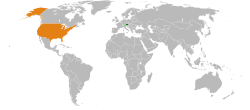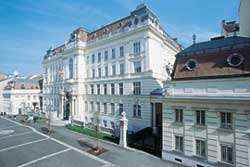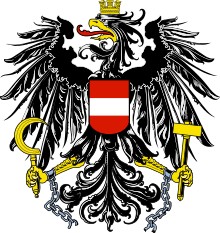Austria–United States relations
 | |
Austria |
United States |
|---|---|

Austria–United States relations are bilateral relations between Austria and the United States.
The U.S. Embassy in Austria is located in Vienna. Since July 2013, the United States Ambassador to Austria is Alexa Wesner. The Austrian Embassy in the U.S. is located in Washington, D.C..
There are roughly 735,128 Austrian Americans residing in the United States.
According to the 2012 U.S. Global Leadership Report, 31% of Austrians approve of U.S. leadership, with 40% disapproving and 29% uncertain.[1]
History
Relations were routine before 1914, with serious strains resulting from the upheavals of 1848-49. Professor Stephen Tuffnell states:
- In its frequent and blundering breaches of etiquette with the Habsburgs, American domestic politics were, as ever, catalytic. Thus, as national-separatist revolutions broke open across the European continent in 1848, ebullient support of Lajos Kossuth and the Hungarian 48ers in the United States drove Washington and Vienna into conflict. Pro-Hungarian fervour in the Senate and Democratic press, stoked by Lewis Cass; State Department flirtation with the recognition of Hungarian independence in the Taylor and Fillmore Presidencies; and, finally, the latter's 1851 'rescue' of Kossuth from the Ottoman Empire on board the USS Mississippi precipitated a breach in relations. Only the death of Daniel Webster, a major opponent of reconciliation, averted the crisis.[2]
In 1917, the United States declared war on the Austro-Hungarian Empire alongside the German Empire after being drawn into the First World War. The U.S. played an important role in Austria's reconstruction after World War II, via the Marshall Plan) and the Austrian State Treaty.
Vienna has frequently been chosen as the venue of key superpower summit meetings, like the Vienna summit in June 1961, with U.S. President John F. Kennedy and Soviet Premier Nikita Khrushchev, or the SALT II agreement in June 1979, with U.S. President Jimmy Carter and Soviet General Secretary Leonid Brezhnev.
In February 1984, the President of Austria Rudolf Kirchschläger paid a state visit to the United States.[3] It was the first state visit of an Austrian President to the United States.[4]
In September 1995, U.S. President Bill Clinton invited the President of Austria Thomas Klestil for a working visit to Washington, D.C.,[5] which took place on October 19.[6]
On June 21, 2006, U.S. President George W. Bush held bilateral talks with the President of Austria Heinz Fischer at the Hofburg Imperial Palace in Vienna, together with U.S. Secretary of State Condoleezza Rice and Foreign Minister of Austria Ursula Plassnik, shortly before a US-European Union summit.[7][8]
See also
References
- ↑ U.S. Global Leadership Project Report - 2012 Gallup
- ↑ Stephen Tuffnell, review of Sovereignty Transformed: U.S.-Habsburg Relations from 1815 to the Paris Peace Conference, (review no. 1556) online
- ↑ "Visits to the U.S. by Foreign Heads of State and Government--1984". Bureau of Public Affairs. Archived from the original on 12 November 2008. Retrieved 22 November 2008.
- ↑ "Remarks of President Reagan and President Rudolf Kirchschlager of Austria at the State Dinner". Ronald Reagan Presidential Library. 1984-02-28. Retrieved 22 November 2008.
- ↑ Woolley, John T.; Peters, Gerhard (1995-09-15). "Digest of Other White House Announcements, September 11". The American Presidency Project. University of California. Retrieved 2008-12-14.
- ↑ Woolley, John T.; Peters, Gerhard (1995-10-20). "Digest of Other White House Announcements, October 19". The American Presidency Project. University of California. Retrieved 2008-12-14.
- ↑ Stolberg, Sheryl Gay (2006-06-25). "In Europe, Bush Hears a Tale of 2 Prisons". The New York Times. Retrieved 2008-12-17.
- ↑ "Gutes und sachliches Gespräch zwischen Bundespräsident Heinz Fischer und US-Präsident George W. Bush" (in German). Federal President of the Republic of Austria. 2006-06-21. Retrieved 2008-12-17.
![]()
Further reading
- Frank, Allison. "The Petroleum War of 1910: Standard Oil, Austria, and the Limits of the Multinational Corporation," American Historical Review (2009) 114#1 pp. 16–41 in JSTOR
- Frank, Tibor. Ethnicity, propaganda, myth-making: Studies on Hungarian connections to Britain and America, 1848-1945 (Akademiai Kiads, 1999)
- Horcicka, Vaclav. "On the Brink of War: The Crisis Year of 1915 in Relations Between the US and Austria-Hungary," Diplomacy & Statecraft (2008) 19#2 pp 187–209. Online. DOI: 10.1080/09592290802096216.3
- Nugent, Walter. "Migration from the German and Austro-Hungarian empires to North America." in The Cambridge survey of world migration (1995) pp: 103-108.
- Phelps, Nicole M. U.S.-Habsburg Relations from 1815 to the Paris Peace Conference (2013) online review
- Spaulding, Ernest Wilder. The quiet invaders: The story of the Austrian impact upon America (Österreichischer Bundesverlag, 1968)
- Steidl, Annemarie et al. From a Multiethnic Empire to a Nation of Nations: Austro-Hungarian Migrants in the US, 1870–1940 (Innsbruck: Studien Verlag, 2017). 354 pp.
- Wagnleitner, Reinhold, and Diana M. Wolf. Coca-colonization and the Cold War: the cultural mission of the United States in Austria after the Second World War (University of North Carolina Press, 1994)
- Zivojinovic, Dragan R. "The Vatican, Woodrow Wilson, And The Dissolution Of The Hapsburg Monarchy 1914-1918," East European Quarterly (1969) 3#1 pp 31–70.
Primary sources
- U.S. Department of State. Foreign Relations of the United States, 1955-1957. Vol. 5: Austrian State Treaty; Summit and Foreign Ministers Meetings, 1955 (1992)
External links
![]()
